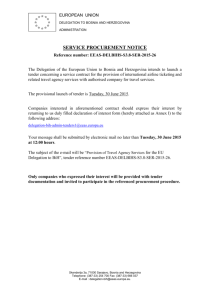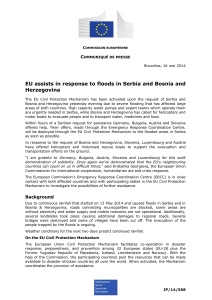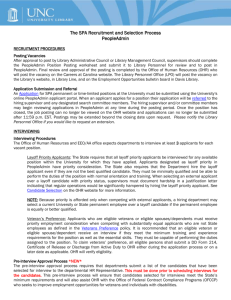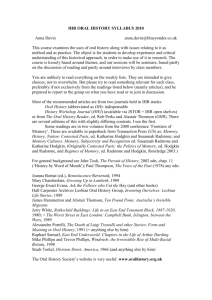3 Budget
advertisement
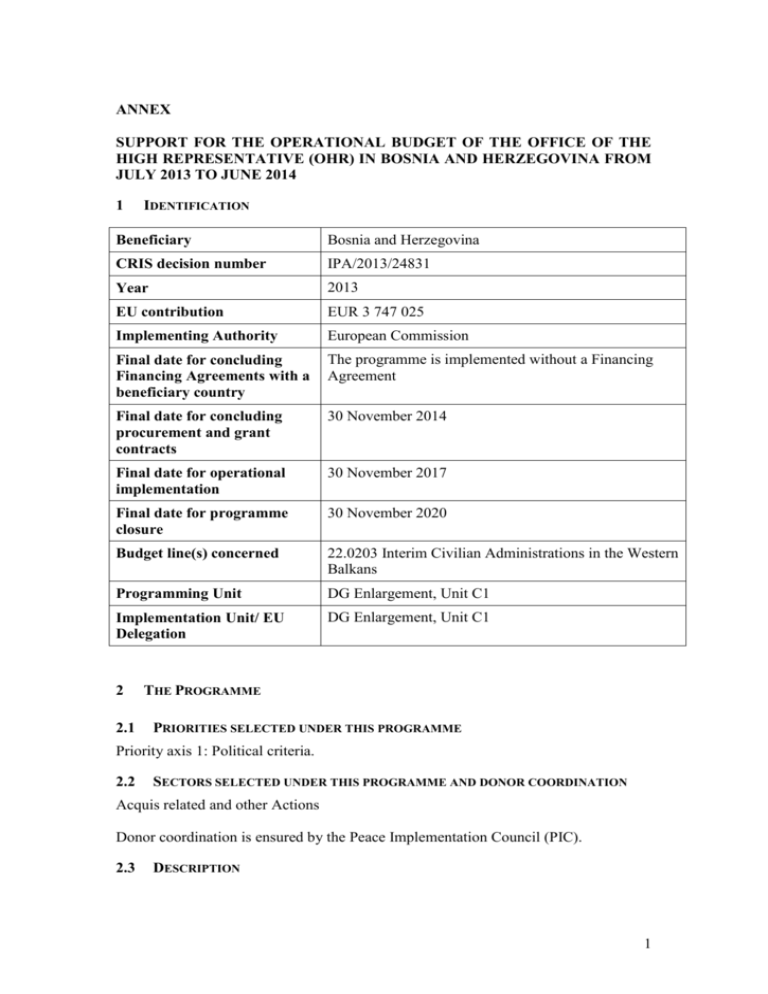
ANNEX SUPPORT FOR THE OPERATIONAL BUDGET OF THE OFFICE OF THE HIGH REPRESENTATIVE (OHR) IN BOSNIA AND HERZEGOVINA FROM JULY 2013 TO JUNE 2014 1 IDENTIFICATION Beneficiary Bosnia and Herzegovina CRIS decision number IPA/2013/24831 Year 2013 EU contribution EUR 3 747 025 Implementing Authority European Commission Final date for concluding Financing Agreements with a beneficiary country The programme is implemented without a Financing Agreement Final date for concluding procurement and grant contracts 30 November 2014 Final date for operational implementation 30 November 2017 Final date for programme closure 30 November 2020 Budget line(s) concerned 22.0203 Interim Civilian Administrations in the Western Balkans Programming Unit DG Enlargement, Unit C1 Implementation Unit/ EU Delegation DG Enlargement, Unit C1 2 2.1 THE PROGRAMME PRIORITIES SELECTED UNDER THIS PROGRAMME Priority axis 1: Political criteria. 2.2 SECTORS SELECTED UNDER THIS PROGRAMME AND DONOR COORDINATION Acquis related and other Actions Donor coordination is ensured by the Peace Implementation Council (PIC). 2.3 DESCRIPTION 1 Project title Support for the operational budget of the Office of the High Representative (OHR) in Bosnia and Herzegovina from July 2013 to June 2014 Overall project objective The overall objective of the assistance to be provided under this programme is to support the High Representative in BiH to fulfil his mandate. The mandate of the High Representative is to oversee all civilian aspects of the implementation of the Peace Agreement for Bosnia and Herzegovina, initialled in Dayton on 21 November 1995 and signed in Paris on 14 December 1995 (The General Framework Agreement for Peace or ‘GFAP’). The mandate of the High Representative is set out in Annex 10 of the GFAP. The Peace Implementation Council (PIC), a group of 55 representatives of governments and international organisations which sponsor and direct the peace implementation process, has subsequently elaborated on his mandate. Specific project objective The specific objective of the assistance to be provided under this programme is to facilitate the smooth operation of the Office of the High Representative (OHR) in Bosnia and Herzegovina from July 2013 to June 2014 and to ensure that the activities of the OHR do not conflict with the tasks and functions of the EU, in particular those of the EUSR in Bosnia and Herzegovina. Main results expected The OHR – in cooperation with the EU - works on the further completion of its mandate, in particular the fulfilment of the remaining "5+2 objectives and conditions" not yet completed. It is expected that the activities of the OHR are well coordinated with the EU. Beneficiary The Office of the High Representative (OHR) in Bosnia and Herzegovina (international organization) Implementation modalities The yearly budget of the OHR is approved by the Steering Board of the PIC, which includes the Commission and several EU Member States, on the basis of the scale and nature of activities entrusted to the OHR in the period considered. The Steering Board also approves the mid-year budget review of the OHR, including revised allocations for each budget item in the budget period. The programme will be implemented by means of a direct operating grant awarded to the Office of the High Representative in Bosnia and Herzegovina, on the basis of Article 190.1(c) of the Rules of Application of the Financial Regulation, which provides for the award of direct grants “to bodies with a de jure or de facto monopoly duly substantiated in the award decision”. The European Union has committed to finance part of the OHR budget until it is completely phased out. To this end, a direct grant agreement will be concluded with the Office of the High Representative in Bosnia and Herzegovina in the 3rd quarter of 2013. 2 A liquidation phase of an additional six months will follow the final closure of the operations of the OHR. The funds for the liquidation phase have already been committed (Commission Decision E/2006/2804 adopted on 15 December 2006). The Commission disbursed 95% of this amount (or EUR 471 534) to the OHR together with the contribution to the Operating Budget for 2007. The OHR ring-fenced the amounts for the Liquidation Budget collected from donors until the PIC finally decides to close the OHR. Funds allocated for liquidation in Commission Decision E/2006/2804 will therefore be used at a later stage than initially foreseen. Selection criteria The OHR has to have the operational and financial capacity to carry out the tasks indicated in the OHR Budget agreed by the PIC Steering Board Ambassadors on 10 June 2013. Award criteria - Relevance of the action - Effectiveness and feasibility of the action - Cost-effectiveness of the action Indicative amount of the grant EUR 3 747 025 Maximum possible rate of EU co-financing 53% of the total operational budget of the Office of the High Representative (OHR) in Bosnia and Herzegovina from July 2013 to June 2014 as approved by the Steering Board Ambassadors on 10 June 2013. In case the contributions of other donors amount to less than the foreseen 47% of the approved budget the EU contribution may exceed 53% of the actual eligible expenditure following a thorough justification and approval on a case by case basis but in any case may not be higher than EUR 3 747 025. Overview of past and on-going assistance The European Union has supported the OHR in Bosnia and Herzegovina since its creation in 1996. EU contributions to the OHR over the years and up to 30 June 2013 have amounted to approximately EUR 159.3 million, partly through CFSP Joint Actions, partly through Commission Decisions adopted on the basis of the Council Regulation (EC) N° 1080/2000 and Council Regulation (EC) N° 1086/2006. The present proposal is complementary to the EU financial assistance provided to Bosnia and Herzegovina under the annual allocation of the IPA programme. 2.4 ASSUMPTIONS AND PRE–CONDITIONS One assumption relating to this Financing Proposal is that, taking into account the situation on the ground, the OHR will continue to operate uninterrupted until 30 June 2014. 3 (i) The grant agreement to be signed with the beneficiary must include the detailed budget agreed in Sarajevo by the PIC Steering Board Ambassadors on 10 June 2013. (ii) Should the OHR’s mandate come to an end before 30 June 2014, the EU contribution will be reduced pro rata. (iii) a) The EU contribution to the budget is granted under the condition that OHR performs the tasks indicated in the OHR Budget (as shown in the explanatory notes under each of the relevant sections) agreed by the PIC Steering Board Ambassadors on 10 June 2013. b) The EU contribution through the Instrument for Pre-accession Assistance to the OHR budget is granted under the assumption that the OHR ensures full coordination of its activities with the EU in line with the EU policy in Bosnia and Herzegovina. 3 BUDGET 4 3.1 INDICATIVE BUDGET TABLE (CENTRALISED MANAGEMENT) Institution Building (IB) Total expenditure Support to the OHR budget for the period July 2013 to June 2014 IPA EU contribution Total (IB + INV) Investment (INV) Contribution by other donors Total expenditure IPA EU contribution EUR (a)=(b)+(c) EUR (b) % EUR (c) % EUR (d)=(e)+(f) EUR (e) 7 069 858 3 747 025 53 3 322 833 47 0 0 Total IPA EU contribution Contribution by other donors % EUR (f) 0 % EUR (g)=(a)+(d) EUR (h)=(b)+(e) % 7 069 858 3 747 025 100 Amounts net of VAT 5 3.2 PRINCIPLE OF CO-FINANCING APPLYING TO THE PROGRAMME The total OHR budget approved by the Peace Implementation Council for the period 1 July 2013 to 30 June 2014 amounts to EUR 7 069 858. The total EU contribution to the OHR under this Financing Proposal amounts to EUR 3 747 025, corresponding to the agreed 53% EU share of the operational OHR budget for the period from 1 July 2013 to 30 June 2014. The funds committed under this Financing Proposal will be disbursed according to the provisions of the grant agreement to be concluded between the Commission and the OHR. The other donors are supposed to contribute to the approved budget of the OHR as follows: United States of America (22%), Japan (10%), Russia (4%), Canada (3.03%), the Organisation of the Islamic Conference (2.5%) and other countries, including EU and Balkan countries (5.47%). However, Russia declared to reduce its contribution to 1.2%. 2.05% of the budget is unallocated as a result of China’s withdrawal from the PIC (0.72%) in 2000 and a decrease of the Ukrainian contribution from 1.48% to 0.148% in the same year. The EU contribution has been calculated in relation to the total eligible expenditure. 4 4.1 IMPLEMENTATION GENERAL RULES FOR PROCUREMENT AND GRANT AWARD PROCEDURES Grant award procedures shall follow the provisions of Part One Title VI and Part Two Title IV Chapter 4 of the Financial Regulation No 966/2012 and Part One Title VI and Part Two Title II Chapter 4 of its Rules of Application. 5 5.1 MONITORING AND EVALUATION MONITORING The Commission may undertake any actions it deems necessary to monitor the programmes concerned. 5.2 EVALUATION Programmes shall be subject to ex ante evaluations, as well as interim and/or, ex post evaluations in accordance with Articles 57 and 82 of IPA Implementing Regulation, with the aim of improving the quality, effectiveness and consistency of the assistance from EU funds and the strategy and implementation of the programmes. The results of evaluations shall be taken into account in the programming and implementation cycle. The Commission may also carry out strategic evaluations. 6 AUDIT, FINANCIAL CONTROL AND ANTI-FRAUD MEASURES The accounts and operations of all parties involved in the implementation of this programme, as well as all contracts and agreements implementing this programme, are subject to, on the one hand, the supervision and financial control by the Commission (including the European 6 Anti-Fraud Office), which may carry out checks at its discretion, either by itself or through an outside auditor and, on the other hand, audits by the European Court of Auditors. This includes measures such as ex-ante verification of tendering and contracting carried out by the EU Delegation in the Beneficiary. In order to ensure the efficient protection of the financial interests of the European Union, the Commission (including the European Anti-Fraud Office) may conduct on-the-spot checks and inspections in accordance with the procedures foreseen in Council Regulation (EC, Euratom) 2185/961. The controls and audits described above are applicable to all contractors, subcontractors and grant beneficiaries who have received EU funds. 1 OJ L 292; 15.11.1996; p. 2 7


